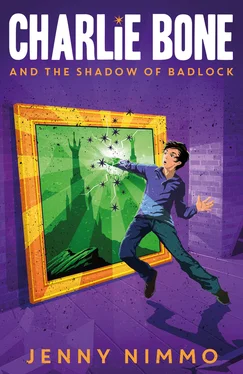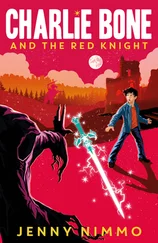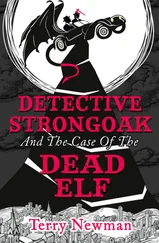Almost falling over his own feet, Benjamin bounded into a cobbled square. In the centre of the square stood an old detached house. It was surrounded by a low wall and a weedy garden. Nailed to the gate was a weathered board that read, ‘ Gunn House ’. The rest of the board was filled with music notes: crochets, quavers, minims and semibreves, though one hardly needed the musical notation to know that a family of musicians lived here. The noise coming from within the house made it obvious. The walls shook with the sound of drums, violins, flutes, cellos and singing voices.
Benjamin pressed the doorbell and a deep recorded voice announced, ‘DOOR! DOOR! DOOR!’
The Gunns’ door-voice always unnerved Benjamin, but then a tinkling bell would have been drowned by the music, and visitors would have waited on the step in vain.
The door was opened by Fidelio Gunn, a violin in one hand and a bow in the other. ‘Hi, Ben, where’s Charlie?’ said the freckle-faced boy.
‘Oi!’ came a shout behind Benjamin.
‘Charlie’s – er –. Can I come in, PLEASE?’ asked Benjamin.
Catching sight of Benjamin’s pursuers, Fidelio said, ‘You’d better.’
Benjamin leapt into Gunn House and Fidelio slammed the door.
‘What’s going on, Ben?’ Fidelio led the way into a chaotic kitchen. A grey cat was eating the remains of a breakfast that still hadn’t been cleared from the table, and a woman in a long colourful skirt was singing at the sink. A small freckle-faced girl tuned her violin beside her.
‘Pianissimo, please, Mum!’ Fidelio shouted. ‘Mimi, take your violin somewhere else.’
Mrs Gunn looked over her shoulder. ‘Benjamin Brown,’ she sang. ‘What a surprise! Can’t believe my eyes! Where’s the dog of impressive size?’
‘Where’s Charlie Bone?’ asked Mimi, plucking a string.
‘Look, Benjamin is a person in his own right,’ said Fidelio. ‘He doesn’t have to have an appendage.’
‘A what?’ said Mimi, plucking another string.
‘An attachment,’ replied her brother. ‘Benjamin’s dog is not permanently attached to him, nor is Charlie. Sit down, Ben.’
Benjamin pulled out a chair and sat down. Feeling hungry, he picked up a piece of dry toast and took a bite out of it.
‘Pudding has just licked that,’ Mimi informed him.
Benjamin eyed the grey cat and sadly replaced the toast.
Fidelio took a chair beside him and leaned forward, his elbows on the table. Mimi stopped plucking at her violin and perched on the other side of the table. Mrs Gunn hummed softly while she scraped at something in the sink.
‘What’s happened, Ben?’ asked Fidelio. ‘It’s not just those morons outside, is it?’
‘No.’ Benjamin looked at Mimi.
‘Mimi always knows what’s going on,’ said Fidelio. ‘You can’t keep secrets from her, but she can keep a secret, can’t you, Mims?’
My lips are already sealed.’ Mimi gave Benjamin a big, sealed smile.
‘OK.’ Benjamin began his story rather slowly, but then the drama of Runner Bean’s disappearance got the better of him and he poured it all out in a tearful rush.
‘I can’t believe it.’ Fidelio sat back. ‘Charlie’s never taken a dog with him before. I didn’t know he could.’
‘He didn’t take him,’ wailed Benjamin. ‘Runner Bean vanished long after Charlie went in. At least I think so. But Charlie’s never gone right into anything, has he? He always stays outside. It’s only his mind that goes in.’
‘Until now,’ Fidelio remarked. ‘Perhaps his endowment is developing.’
Benjamin shook his head. ‘Something’s wrong, Fido.’ He got up and walked over to a window that overlooked the square. ‘My stalkers have gone. I think I’ll take a chance and run up to the bookshop. Charlie’s uncle will know what to do.’
‘Has he . . . has he . . . has he . . . popped the question?’ sang Mrs Gunn.
‘Pardon?’ said Benjamin.
‘Uncle Paton, Mr Yewbeam,’ Mrs Gunn dropped her musical tone temporarily. ‘He’s surely going to make an honest woman of Miss Ingledew. How can he resist? He really ought to marry her. The whole city is waiting.’
‘You mean you ’ re waiting, Mum,’ said Fidelio. He turned to Benjamin. ‘I’ll come with you, Ben. Don’t like to think of you alone in this city without your dog.’
‘I am eleven,’ sighed Benjamin.
‘And I’m twelve,’ said Fidelio firmly. ‘There’s a difference.’
After weeks of dark skies and frosty winds, today a few rays of frail sunshine had begun to filter into the city. They did nothing to lift Ben’s spirits. He felt quite resentful towards Charlie for doing something so risky. But that was Charlie all over. He was always rushing into situations without thinking them through.
Fidelio, who seemed to have read Benjamin’s mind, said, ‘It’s possible that Charlie never meant to go into that painting. He might have been sucked in, against his will, just like your dog.’
‘Hm,’ Benjamin grunted.
The boys were now entering the narrow cobbled street that led to the cathedral. On either side of them, half-timbered houses with ancient crooked roofs leaned over the cobbles at dangerous angles. The bookshop stood directly opposite the great domed cathedral; a sign above the door read Ingledews in olde worlde script and, in the window, two large leatherbound books were displayed against a curtain of dark red velvet. Miss Ingledew sold rare and precious books.
If the boys had paid attention to the gleaming black car that stood outside the shop, they might have had second thoughts, but they were in such a hurry they rushed straight in. A small bell, attached to the inside of the door, tinkled pleasantly as they entered the shop. The sight that met their eyes, however, was not at all pleasant.
Sitting in a wheelchair beside the counter was Mr Ezekiel Bloor, the owner of Bloor’s Academy. Mr Ezekiel, as he liked to be called, was a hundred and one years old and his head was as close a thing to a living skull as you’re ever likely to see. He was covered in a tartan blanket and wore a red woollen hat pulled well down over his large wrinkled ears. There was very little flesh covering his large nose with its high knobbly ridge, or the sharp cheekbones and long chin. Mr Ezekiel’s eyes, however, were another matter. They glittered beneath the protruding forehead as black and lively as the eyes of a ten-year-old.
Behind the ancient man’s wheelchair stood a burly, bald-headed man: Mr Weedon was the school porter, chauffeur, handyman and gardener. There was nothing he would not have done for Mr Ezekiel, including murder.
Fidelio and Benjamin would gladly have stepped backwards out of the door, but it was too late to escape. They reluctantly descended the three steps into the shop.
‘Aha!’ croaked Ezekiel. ‘What have we here? Odd customers for a rare book, I’d say. I bet you haven’t got a hundred pounds to spare, Fidelio Gunn, not coming from a family of eight. You can’t even afford a pair of shoes, I’d say.’ He directed his mocking gaze at Fidelio’s shabby trainers.
Fidelio shifted his feet self-consciously, but he was not the sort to be outdone, even by the owner of Bloor’s Academy. ‘I save my best for school, sir,’ he said, ‘and we’ve come to see Emma Tolly.’
‘Girlfriend, is she?’ snorted Ezekiel. ‘The little bird?’
‘Not at all, sir,’ Fidelio said calmly. ‘She’s a friend.’
‘And who’s the scrawny lad trying to hide in your shadow?’ Mr Ezekiel twisted his head to see Benjamin, who was, indeed, trying to hide behind Fidelio. ‘Who are you, boy? Speak up!’
Benjamin was now in quite a state; desperate to get help for Runner Bean, he could scarcely concentrate on anything else, yet he knew he couldn’t mention his dog’s disappearance to Mr Ezekiel.
Читать дальше












